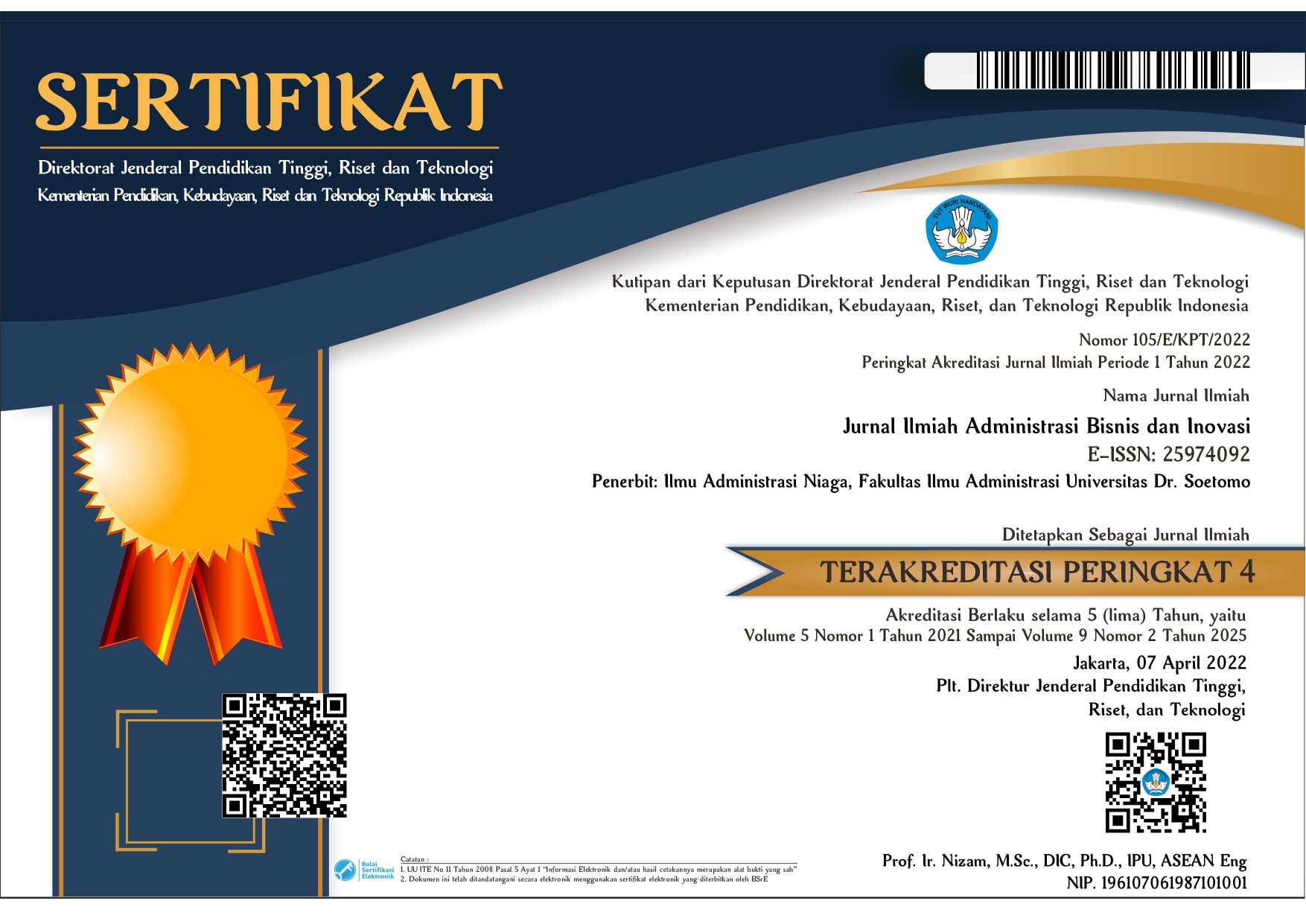Pengaruh Person-Job Fit dan Person-Organization Fit Terhadap Kinerja Karyawan PT. Sumatraco Langgeng Makmur
 Abstract views: 822
,
Abstract views: 822
,
 Full Text (PDF) downloads: 1914
Full Text (PDF) downloads: 1914
Abstract
This research is motivated by facts or phenomena that are happening at this time, namely the fit between personality and work (Person-Job Fit) and the fit between personality and company environment/culture (Person-Organization Fit) which still influence employee performance at PT. Sumatraco Langgeng Prosperous. This study uses a quantitative approach and the type of research used is explanation/relationship. The sample used in this study amounted to 225 respondents. The results of this study using multiple regression methods can be concluded that partially the person-job fit variable has a significant influence on employee performance with a significance value of 0.000 <0.05 and also tcount (5.577) > ttable (1.972). Meanwhile, the person-organization fit variable also has a significant influence on employee performance with a significance value of 0.000 <0.05 and tcount (3.941) > ttable (1.972). Simultaneously the variables person-job fit and person-organization fit have a significant effect on employee performance with a significance value of 0.000 <0.05 and also the value of Fcount (42.088) > Ftable (4.7)
References
Anindita, A. (2020). Pengaruh Person Organization Fit dan Person Job Fit Terhadap Kinerja Pegawai Melalui Komitmen Afektif Pada Kantor Cabang Dinas Pendidikan Wilayah Kota Surabaya Provinsi Jawa Timur. Jurnal Ilmu Manajemen (JIM), 8(1).
Astuti, S. D. (2010). Model person-organization fit (PO Fit Model) terhadap kepuasan kerja, komitmen organisasional dan kinerja karyawan. Jurnal Bisnis Dan Ekonomi, 17(1).
Autry, C. W., & Daugherty, P. J. (2003). Warehouse operations employees: linking person‐organization fit, job satisfaction, and coping responses. Journal of Business Logistics, 24(1), 171–197.
Aydin, B., & Ceylan, A. (2008). The employee satisfaction in metalworking manufacturing: How do organizational culture and organizational learning capacity jointly affect it?
Bahri, S., & Nisa, Y. C. (2017). Pengaruh Pengembangan Karir Dan Motivasi Kerja Terhadap Kepuasan Kerja Karyawan. Jurnal Ilmiah Manajemen Dan Bisnis, 18(1), 9–15.
Bangun, O. V., Supartha, I. W. G., & Subudi, M. (2017). Pengaruh person-job fit dan person-organization fit terhadap komitmen organisasional dan organizational citizenship behavior (OCB). E-Jurnal Ekonomi Dan Bisnis Universitas Udayana 6.5 (2017): 2071-2102, 5, 2071–2102. https://ojs.unud.ac.id/index.php/EEB/article/download/29794/18688/
Chatman, J. A. (1989). Matching people and organizations: Selection and socialization in public accounting firms. Academy of Management Proceedings, 1989(1), 199–203.
Dunggio, S. (2020). Pengaruh Budaya Organisasi Terhadap Kinerja Pegawai Di Kantor Camat Dungingi Kota Gorontalo. Publik: Jurnal Manajemen Sumber Daya Manusia, Administrasi Dan Pelayanan Publik, 7(1), 1–9.
Farooqui, M. S., & Nagendra, A. (2014). The impact of person organization fit on job satisfaction and performance of the employees. Procedia Economics and Finance, 11, 122–129.
Hoffman, B. J., Bynum, B. H., Piccolo, R. F., & Sutton, A. W. (2011). Person-organization value congruence: How transformational leaders influence work group effectiveness. Academy of Management Journal, 54(4), 779–796.
Kristof‐Brown, A. L. (2000). PERCEIVED APPLICANT FIT: DISTINGUISHING BETWEEN RECRUITERS’PERCEPTIONS OF PERSON‐JOB AND PERSON‐ORGANIZATION FIT. Personnel Psychology, 53(3), 643–671.
Morley, M. J. (2007). Person‐organization fit. Journal of Managerial Psychology.
Muis, M. R., Jufrizen, J., & Fahmi, M. (2018). Pengaruh budaya organisasi dan komitmen organisasi terhadap kinerja karyawan. Jesya (Jurnal Ekonomi Dan Ekonomi Syariah), 1(1), 9–25.
Paliy, I. G., Plotnikova, T. v, Shtofer, L. L., & Tumaykin, I. v. (2017). Features of social and economic transformations in the globalization era. European Research Studies Journal, 20(1), 117–128.
Prawirosentono, S., & Primasari, D. (2022). Manajemen Stratejik & Pengambilan Keputusan Korporasi (Strategic Management & Corporate Decision Making). Bumi Aksara.
Rajper, Z. A., Ghumro, I. A., & Mangi, R. A. (2020). The Impact of Person Job Fit and Person Organization Fit on Employee Job Performance: A Study among Employee of Services Sector. Abasyn University Journal of Social Sciences, 13(1).
Reuvers, M., van Engen, M. L., Vinkenburg, C. J., & Wilson‐Evered, E. (2008). Transformational leadership and innovative work behaviour: Exploring the relevance of gender differences. Creativity and Innovation Management, 17(3), 227–244.
Rivaldo, Y. (2022). Monograf Peningkatan Kinerja Karyawan.
Rudy, I. S. (2019). Person Job Fit, Komitmen Organisasi dan Pengawasan terhadap Kinerja Karyawan Rumah Sakit Bhayangkara Banjarmasin. Journal of Technopreneurship on Economics and Business Review, 1(1), 34–46. https://doi.org/10.37195/jtebr.v1i1.9
Utaminingsih, A. (2014). Perilaku Organisasi: Kajian Teoritik & Empirik Terhadap Budaya Organisasi, Gaya Kepemimpinan, Kepercayaan dan Komitmen. Universitas Brawijaya Press.
Wijaya, M. (2020). Revolusi Industri 4.0: Implikasi terhadap Manajemen Sumberdaya Manusia. Media Informatika, 19(2), 51–60.
Copyright (c) 2023 Hadad Dinanjar Sayuga, Arie Ambarwati, Rini Fatmawati

This work is licensed under a Creative Commons Attribution-NonCommercial-ShareAlike 4.0 International License.
Authors who publish with Inform: JIABI: Jurnal Ilmiah Administrasi Bisnis dan Inovasi agree to the following terms:
Authors retain copyright and grant the journal right of first publication with the work simultaneously licensed under a Creative Commons Attribution License (CC BY-SA 4.0) that allows others to share the work with an acknowledgment of the work's authorship and initial publication in this journal.
Authors are able to enter into separate, additional contractual arrangements for the non-exclusive distribution of the journal's published version of the work (e.g., post it to an institutional repository or publish it in a book), with an acknowledgment of its initial publication in this journal.
Authors are permitted and encouraged to post their work online (e.g., in institutional repositories or on their website) prior to and during the submission process, as it can lead to productive exchanges, as well as earlier and greater citation of published work.








